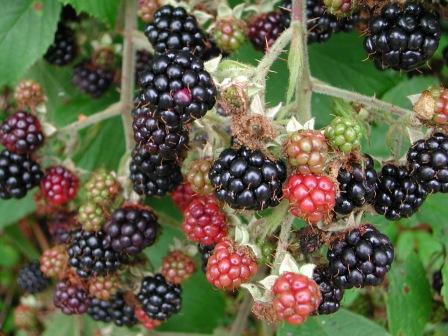
“Blackberries”
“They left my hands like a printer’s
Or thief’s before a police blotter
& pulled me into early morning’s
Terrestrial sweetness, so thick
The damp ground was consecrated
Where they fell among a garland of thorns.
Although I could smell old lime-covered
History, at ten I’d still hold out my hands
& berries fell into them. Eating from one
& filling a half gallon with the other,
I ate the mythology & dreamt
Of pies & cobbler, almost
Needful as forgiveness. My bird dog Spot
Eyed blue jays & thrashers. The mud frogs
In rich blackness, hid from daylight.
An hour later, beside City Limits Road
I balanced a gleaming can in each hand,
Limboed between worlds, repeating one dollar.
The big blue car made me sweat.
Wintertime crawled out of the windows.
When I leaned closer I saw the boy
& girl my age, in the wide back seat
Smirking, & it was then I remembered my fingers
Burning with thorns among berries too ripe to touch.”
-Yusef Komunyakaa
This poem tells the story of a boy out picking blackberries in a thicket in the woods. The juice leaves his hands stained from the juicy berries as they dripped onto the ground. He eats some and collects others, daydreaming and thinking about mythology and history. His dog spot is with him and keeps eyeing the birds. A car passes him when he nears the road and the two children smirking at him from the back seat bring him back down to earth.
One of the really interesting threads in this poem is the continueing feeling of guilt from the author. In the beginning the dark juice of the berries on his hands makes him think of a thief being handprinted by the police. This is just the beginning of the feeling of guilt. Later on the poem, Komunyakaa references the need for forgiveness. Even the frogs are hiding from daylight in the dark of the mud. When the car pulls up, he starts sweating, often a sign of nervousness or guilt about something. It is after this occurance that he snaps out of his daydream and once again feels the sting of the prickers and notices the juice on his hands.
This idea is juxtaposed to another, more innocent thread with allusions to the bible. In the first stanza, the berries fall off the branches into a “garland of thorns”, a clear allusion to the crown of the thorns Jesus wore at the time of his crucifixion. The berries also consecrate the ground, making it holy. The berries can also be an symbol for the garden of Eden and the innocence represented by the fruit within it. Because Komunyakaa was only ten, he was still innocent enough that the pure fruit would fall of the branches for him; he did not need to pick by force.
When these two themes are put together, they paint a picture of the struggle of the racial tension that was going on in the country at the time of Komunyakaa’s childhood. Komunyakaa could “smell the lime-covered history”, or history that has already gone by (lime used to be sprinkled on graves to aid the breakdown of corpses), and has a sense of what has gone on, but he still has enough innocence that the berries will simply fall into his hands. Some he eats, innocently, and dreams of grander things, while at the same time, he works on filling up a tin to take home later and make pies and cobbler. This illustrates the controversy that is going on as Komunyakaa balances on the brink between innocence and growing up and realizing the full impacts of racism. The same idea is carried on further. The dog, a sensible, domesticated pet, which most of the time is considered property, eyes the birds which are wild, free, and lofty above him. The mud frogs, which are not exactly the most glamorous animals in the world hide in the “blackness” from the daylight.
The final paragraph finally applies the idea to Komunyakaa. He is lost in his own world with his can gleaming like a trophy full of blackberries. When he sees the boy and the girl watching him coldly (“wintertime crawled out the windows”), from the comfortable, clean, padded seats as they are driven around, he realizes how dirty he is from picking berries. Their smirk shocks him out of his daydreams, and the thorns become a negative object, burning his fingers, just like the crown of thorns, and the realization that his hands are so dirty and dark once again physically mark him as different from the children in the car.
Posted by Fruits of the Earth « Mrs. B's Tales on June 11, 2010 at 2:04 pm
[…] https://dandeliondiadem.wordpress.com/2009/06/18/blackberries-by-yusef-komunyakaa/ […]
Posted by Fruits of the Earth « Living in the Light on June 22, 2010 at 8:57 pm
[…] https://dandeliondiadem.wordpress.com/2009/06/18/blackberries-by-yusef-komunyakaa/ […]